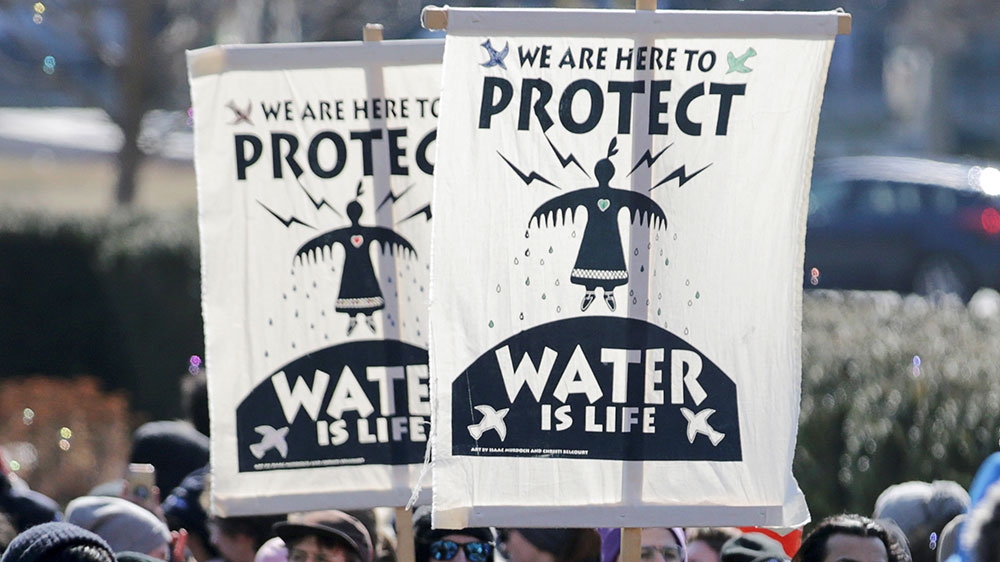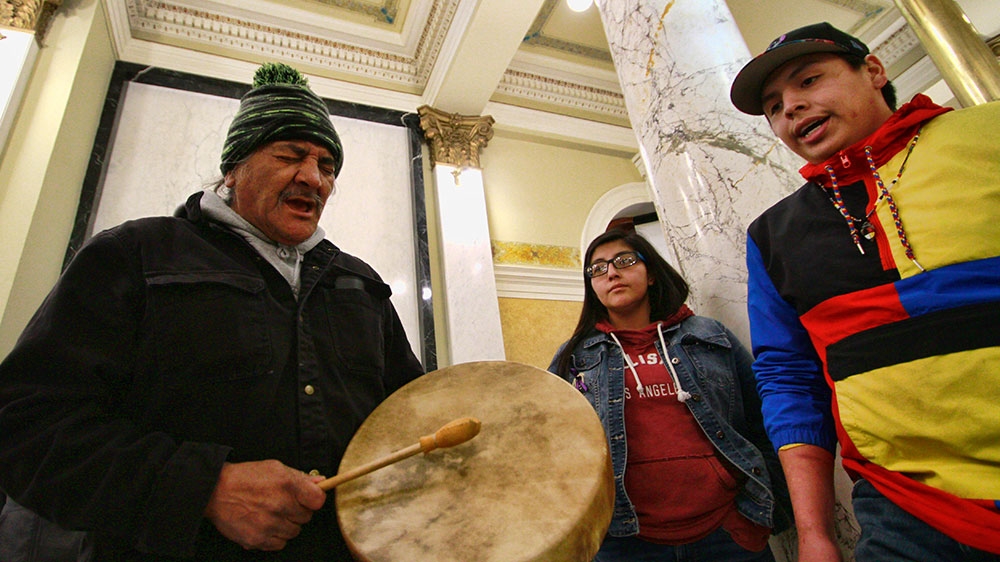Indigenous fear Canada work camps will be coronavirus incubators
Construction work on pipelines, dams raises risk of COVID-19 spread, harm to nearby communities, Indigenous leaders say.

Montreal, Canada – Coronavirus cases are rising steadily in Canada and the United States, and many communities have shut down non-essential businesses and services to try to stop its spread.
What makes something “essential”, however, is a point of contention – and critics have questioned why companies are still working on major resource extraction projects, such as oil and gas pipelines and hydroelectric dams, during the crisis.
Keep reading
list of 4 itemsWill the US unemployment rate continue at historic lows?
Mexico’s teachers seek relief from pandemic-era spike in school robberies
‘A bad chapter’: Tracing the origins of Ecuador’s rise in gang violence
In the western Canadian province of British Columbia, Indigenous leaders say a potential outbreak of the coronavirus among hundreds of workers deployed to build various projects could risk overwhelming local healthcare systems and put communities at heightened risk.
“We think it’s totally irresponsible and dangerous for them to be moving crews back and forth the way they are,” said Chief Roland Willson of West Moberly First Nations, a Dunne-za Cree community, about continuing construction work at the nearby Site C dam, which is run by BC Hydro and Power Authority, a private electric utility known as BC Hydro.
West Moberly, which counts 340 members, one-third of which live on the reserve, has been opposed to the 1,100-megawatt hydroelectric dam project for years, citing concerns that Site C would do irreparable damage to their ancestral territory and way of life.
Willson said community members now also fear that the hundreds of workers who continue to be sent up to the construction site could contribute to an outbreak of the coronavirus and the potential spread of COVID-19.
“That’s how this thing spreads: people travelling around back and forth. And you don’t know who has come into contact with anybody” that is carrying the coronavirus, he said. “It’s very hard to understand why BC Hydro hasn’t shut down [Site C].”
Scaling down operations
The Site C construction site sits 7 kilometres (4 miles) southwest of Fort St John, a town of 21,000 that on March 24 declared a local state of emergency. “These are unprecedented times and we find ourselves with limited tools at our disposal,” Mayor Lori Ackerman said at the time.
While non-essential businesses were ordered close across the province as of March 18, work was allowed to continue at Site C, as well as at other major resource extraction projects across BC, because the provincial government designated “critical infrastructure service providers” as essential services that could remain open during the coronavirus crisis.
Electricity, drilling and production, and oil and natural gas projects were included on the list.
BC Hydro said on March 24 it would not move any workers who are in self-isolation at the camp with coronavirus symptoms into the city for treatment to avoid putting an added strain on the local healthcare system.

A BC Hydro spokeswoman said as of March 26, the camp counted 864 workers. “This is close to half of the workforce of 1,700 we typically have staying in camp at this time of year,” Tanya Fish said in an email to Al Jazeera, adding that there were no confirmed cases of COVID-19 at Site C.
Of the 1,203 confirmed cases of COVID-19 across BC as of Saturday, 21 were in the north of the province. About 300,000 people are served by Northern Health, the local provincial health agency, in that specific area.
Fish said measures have been taken to lower the risk of the coronavirus at the workers’ camp, such as the closure of common areas, frequent cleaning, and setting up tables to allow the workers to maintain physical distancing.
A 30-room dormitory is designated for worker self-isolation, and four others can also be used as needed, she said. As of Sunday, 10 workers were in self-isolation. “BC Hydro’s top priority on the Site C project will always be the safety of our employees, workers and people living in the community,” Fish said.
Coronavirus ‘incubators’
The state of emergencies and actions taken by BC Hydro and other utilities has not assuaged the concerns of some Indigenous community members and advocacy groups, who continue to raise concerns about COVID-19’s spread at industrial work camps.
The Union of British Columbia Indian Chiefs (UBCIC) on March 30 called for work to be suspended on Coastal GasLink, a pipeline project that faces staunch opposition from members of the Wet’suwet’en Nation in northern BC and sparked nationwide protests earlier this year, over the issue.
“The camps represent a concentration of a transient workforce that are living in close proximity,” said Grand Chief Stewart Phillip, the UBCIC president. “It’s a ripe breeding ground for [the] spread of the COVID-19 virus, which in turn could spread into our communities.”
Last week, Canadian media outlets reported that an employee working on LNG Canada’s liquefied natural gas export facility in Kitimat, in northwest BC, tested positive for COVID-19. The worker went home to self-isolate. “Currently, no one staying at the lodges has tested positive for COVID-19,” an LNG spokeswoman told Global News.
”[The
represent a very real threat to the health, safety and wellbeing of not only Indigenous communities, but the adjacent communities to these camps … It’s an unacceptable contradiction and it needs to be addressed immediately.”]
Phillip said allowing the labour camps to continue to operate flies in the face of the advice public health officials have been giving the public around social distancing and other measures meant to curb the spread of COVID-19.
The camps “represent a very real threat to the health, safety and wellbeing of not only Indigenous communities, but the adjacent communities to these camps”, Phillip told Al Jazeera. “It’s an unacceptable contradiction and it needs to be addressed immediately.”
Dr David Bowering, the former chief medical health officer at Northern Health, echoed that call, saying in an open letter on March 28 that all industrial work camps across the province – which he described as “essentially landlocked cruise ships” – should be shut down.
“The camps are and will be COVID-19 incubators placing the workers, the host communities, and the home communities of the workers at unacceptable risk,” Bowering wrote.
Earlier last month, labour advocates also urged the companies behind these megaprojects to scale back their operations to keep workers safe. “We realise that there will be a financial consequence to our members, but the health and safety of our workers is paramount,” said Andrew Mercier, executive director of the BC Building Trades Council, which represents 35,000 unionised construction workers.
‘Sacrificing us’
South of the border, Indigenous community leaders have also slammed ongoing construction on major projects, including the contentious Keystone XL oil pipeline, which will run 1,947km (1,210 miles) from the Canadian province of Alberta to the US state of Nebraska.
A petition was recently launched to demand that the company behind the project, TC Energy (formerly Trans Canada Corp) immediately stop preconstruction activities on the pipeline, and withdraw workers already dispatched along the route.
In late March, TC Energy said it was moving ahead with pipeline construction after it said the provincial government of Alberta agreed to invest $1.1bn (about 1.4 billion Canadian dollars) in the $8bn project.
Faith Spotted Eagle, an Indigenous activist in South Dakota and executive director of the Brave Heart Society, a group of grandmothers that protects Lakota, Nakota and Dakota culture, said Keystone XL construction equipment is being moved into man camp areas.
She said this is happening while people are otherwise preoccupied with the coronavirus crisis. “It’s kind of like their strategy is that we’ll just keep on working and maybe the governor won’t pay attention. We’ll just keep on going. The tribes are going to be incapacitated,” she told Al Jazeera.

A coronavirus outbreak among pipeline workers in South Dakota would be extremely harmful for Indigenous peoples, she said, because Indigenous families are often large, with several people living in close proximity, and many people living on reservations do not have easy access to healthcare services.
It can take up to two hours for some people to get medical care in a nearby city, she added.
“If they do not stop the construction and the man camps, they are arbitrarily and deliberately sacrificing the Indigenous population of South Dakota, Montana, Nebraska. They are sacrificing us just like they’ve done over and over, and over again,” she said.
Threat to elders
Back in northeast BC, Willson in West Moberly First Nations said the community has set up a checkpoint to restrict movement in and out, and asked people not to visit in order to stem any potential spread of the coronavirus.
COVID-19 poses a particularly high risk to First Nations elders, he said, who are the keepers of traditional knowledge and ceremonies, much of which has been lost as a result of colonialism and state policies designed to cut Indigenous peoples off from their traditions, languages and cultures.
“Elders in First Nations communities are held in high regard. If something like this happens, it would be devastating to us. It would be like [the] Spanish Flu epidemic that came through here and wiped people out,” Willson said.
In those circumstances, it is irresponsible to keep work at the Site C dam going – but Willson said he did not feel as though his community’s concerns are being heard.
“If we’re trying to stop this thing, then we need to be serious and stop this thing. Some construction is essential, but Site C is not. There’s nothing essential about what’s going on at Site C.”